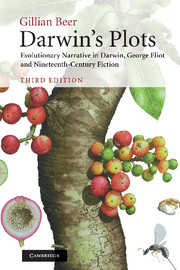Book contents
- Frontmatter
- Contents
- Foreword by George Levine
- Preface to the first edition
- Preface to the second edition
- Preface to the third edition
- Introduction
- Part I Darwin's language
- Part II Darwin's plots
- 3 Analogy, metaphor and narrative in The Origin
- 4 Darwinian myths
- Part III Responses: George Eliot and Thomas Hardy
- Notes
- Select bibliography of primary works
- Further reading related to Charles Darwin
- Index
3 - Analogy, metaphor and narrative in The Origin
Published online by Cambridge University Press: 04 August 2010
- Frontmatter
- Contents
- Foreword by George Levine
- Preface to the first edition
- Preface to the second edition
- Preface to the third edition
- Introduction
- Part I Darwin's language
- Part II Darwin's plots
- 3 Analogy, metaphor and narrative in The Origin
- 4 Darwinian myths
- Part III Responses: George Eliot and Thomas Hardy
- Notes
- Select bibliography of primary works
- Further reading related to Charles Darwin
- Index
Summary
Arnold wrote to Clough of Keats that Keats did not understand that one ‘must begin with an Idea of the world, in order not to be prevailed over by the world's multifariousness’. Darwin is on Keats's side of this argument. He begins with the multifariousness of the world, is even prevailed over by it, and then uses it as both material and idea. Such an attitude in itself goes some way towards resolving the problem of first causes and of teleology. He refuses any precedent ‘Idea’ of the world from which to begin. This is not to suggest that he refuses theory, or that he believes facts to be authoritatively inert. In a letter to Fawcett in 1861 he made his position clear:
About thirty years ago there was much talk that geologists ought only to observe and not theorise; and I well remember someone saying that at this rate a man might as well go into a gravel-pit and count the pebbles and describe the colours. How odd it is that anyone should not see that all observation must be for or against some view if it is to be of any service.
In his Reminiscences of his father Francis Darwin wrote that ‘it was as though he were charged with theorising power ready to flow into any channel on the slightest disturbance, so that no fact, however small, could avoid releasing a stream of theory’.
- Type
- Chapter
- Information
- Darwin's PlotsEvolutionary Narrative in Darwin, George Eliot and Nineteenth-Century Fiction, pp. 73 - 96Publisher: Cambridge University PressPrint publication year: 2009



